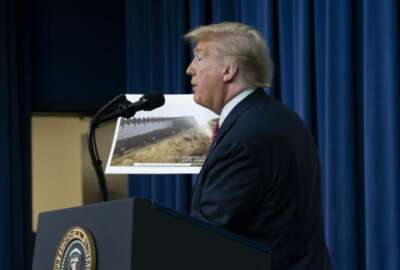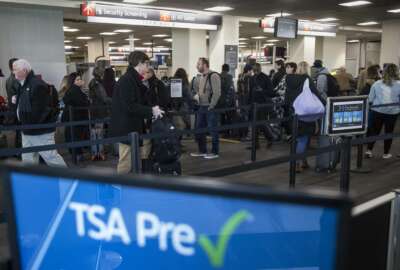
State Dept. workforce is now more diverse, but its leadership is not
In today's Federal Newscast, a new report from the Government Accountability Office shows that while diversity has increased among workers at the State Departm...
To listen to the Federal Newscast on your phone or mobile device, subscribe in PodcastOne or Apple Podcasts. The best listening experience on desktop can be found using Chrome, Firefox or Safari.
- The State Department’s workforce has grown more diverse over nearly two decades, but that diversity hasn’t filtered up to the agency’s higher ranks. The Government Accountability Office found the overall racial and ethnic diversity of State’s workforce increased, from 28% in 2002 to 32% in 2018. But the watchdog also found that the agency remains less diverse at the GS-13 level and above in the Civil Service, and at all ranks of the Foreign Service. Meanwhile, GAO found that minority workers saw a lower rate of promotion than white employees.
- A clearer view of how long it takes to hire a new person to government is on the horizon. The Office of Personnel Management says agencies should begin to count time-to-hire for all positions, not just those posted on USAJobs. Agencies should also start counting from the time managers check off on the need for a hire to when a new employee accepts a tentative job offer. It took agencies an average of 98 days to hire a new employee in 2018. That’s better than the previous year’s time-to-hire of almost 106 days.
- 300,000 community partners have now been hired by the Census Bureau for the 2020 population count, despite concerns from overseers. These partners include local businesses, schools, and faith-based organizations, that will try to boost the self-response rates. The bureau aimed to meet its partnership goal by March. Earlier this month, the Government Accountability Office warned that the bureau had missed interim deadlines to meet its partnership goal. (U.S. Census Bureau)
- The Department of Energy is facing a lawsuit over a recent decision on light bulb regulation. Several environmental and consumer groups are steamed that the agency decided not to move ahead with new, more stringent efficiency standards for incandescent bulbs. During rule-making, regulators determined the standard would quadruple the retail price of the bulbs. Now several groups, lead by the Natural Resources Defense Council, have asked the federal court of appeals for the Second Circuit to force Energy to implement the new standards. They cite a 2007 law requiring them.
- National Guard leaders are appealing to the White House to restore funds diverted for a wall on the southern border. The Adjutants General Association want President Trump and the Defense Department to give the guard back its $1.7 billion now slated for the wall. They claim the National Guard is specifically targeted by the cuts. (Federal News Network)
- The Pentagon looks to give states a nudge towards helping military spouses get the licenses they need to work after moving. A new report lays out recommendations for how states can ease the process. The main one is implementing policies that are on the books but not yet in use. The final goal is for states to make interstate compacts for specific occupations so spouses can move from one state to another without going through the red tape of being recertified. (Federal News Network)
- An Arkansas man faces federal arson charges for allegedly trying to blow up a vehicle in one of the Pentagon’s parking lots. Pentagon police say they caught Matthew Richardson trying to ignite a Land Rover’s gas tank with a cigarette lighter and a piece of fabric on Monday. The vehicle belongs to a Pentagon employee who claims not to know Richardson. Officers say they arrested him in Arlington National Cemetery a short while later. (Federal News Network)
- The long saga of electronic health record interoperability is getting a fresh look from the inspectors general at the Veterans Affairs and Defense departments. The two IGs say they’re launching a rare joint audit to figure out how their departments’ latest efforts at a seamless health record are working. Both VA and DoD have committed to billions of dollars in spending on variants of Cerner’s Millennium electronic health record, but both have run into implementation challenges. VA officials have decided to delay the first round of rollouts. They’re scheduled to appear on Capitol Hill later this week to explain the reasons. (Department of Defense)
- After congressional complaints, the Transportation Security Administration has banned its employees from using the social media app TikTok, according to The Hill. TSA follows bans of the video platform by the both the Army and Navy. The concerns stem from the app’s Chinese ownership and its potential security issues.
- DHS is playing catch up when it comes to fight against ransomware. Calling it the scourge of the internet, Chris Krebs says the Department of Homeland Security was late to the game in recognizing the threat of ransomware. The director of the Cybersecurity and Infrastructure Security Agency or CISA, says only through broad threat intelligence sharing can agencies and the private sector defend against ransomware and other cyber attack vectors. Speaking at the RSA conference in San Francisco, Krebs says DHS, the intelligence community and the private sector must work together to better understand the threat landscape and conditions to stay ahead of the hackers.
- The Thrift Savings Plan still can’t pass its annual cybersecurity audit. But there are several signs the Federal Retirement Thrift Investment Board is improving. Seven metrics on the Federal Information Security Modernization Act model improved by one maturity level or more. But an independent consultant says the agency still needs a comprehensive security program. The consultant says the agency has too many conflicting priorities and too few resources to support multiple IT initiatives.
- Republicans on the House Transportation and Infrastructure Committee have named their new leader to focus on federal building and emergency management issues. Congressman John Katko (R-N.Y.) will now serve as the ranking member of the Subcommittee on Economic Development, Public Buildings and Emergency Management. Congressman Sam Graves (R-Mo.) ranking member of the full committee, appointed Katko to the leadership role. Congressman Mark Meadows (R-N.C.) previously served as the subcommittee’s ranking member. (House Transportation and Infrastructure Committee)
Copyright © 2024 Federal News Network. All rights reserved. This website is not intended for users located within the European Economic Area.
Eric White
Eric White is news anchor and Federal Drive producer at Federal News Network.
Follow @FEDERALNEWSCAST
Related Stories
Related Topics
Adjutants General Association
All News
Census Bureau
Chris Krebs
Cybersecurity and Infrastructure Security Agency
Department of Homeland Security
diversity equity inclusion and accessibility
electronic health records
Energy Department
Federal Drive
Federal Information Security Modernization Act
Federal Newscast
Federal Retirement Thrift Investment Board
Government Accountability Office
Hiring/Retention
House Transportation and Infrastructure Committee
John Katko
Management
Mike Pompeo
Sam Graves
State Department
Transportation Security Administration
USAJobs
Workforce
Workforce Rights/Governance





